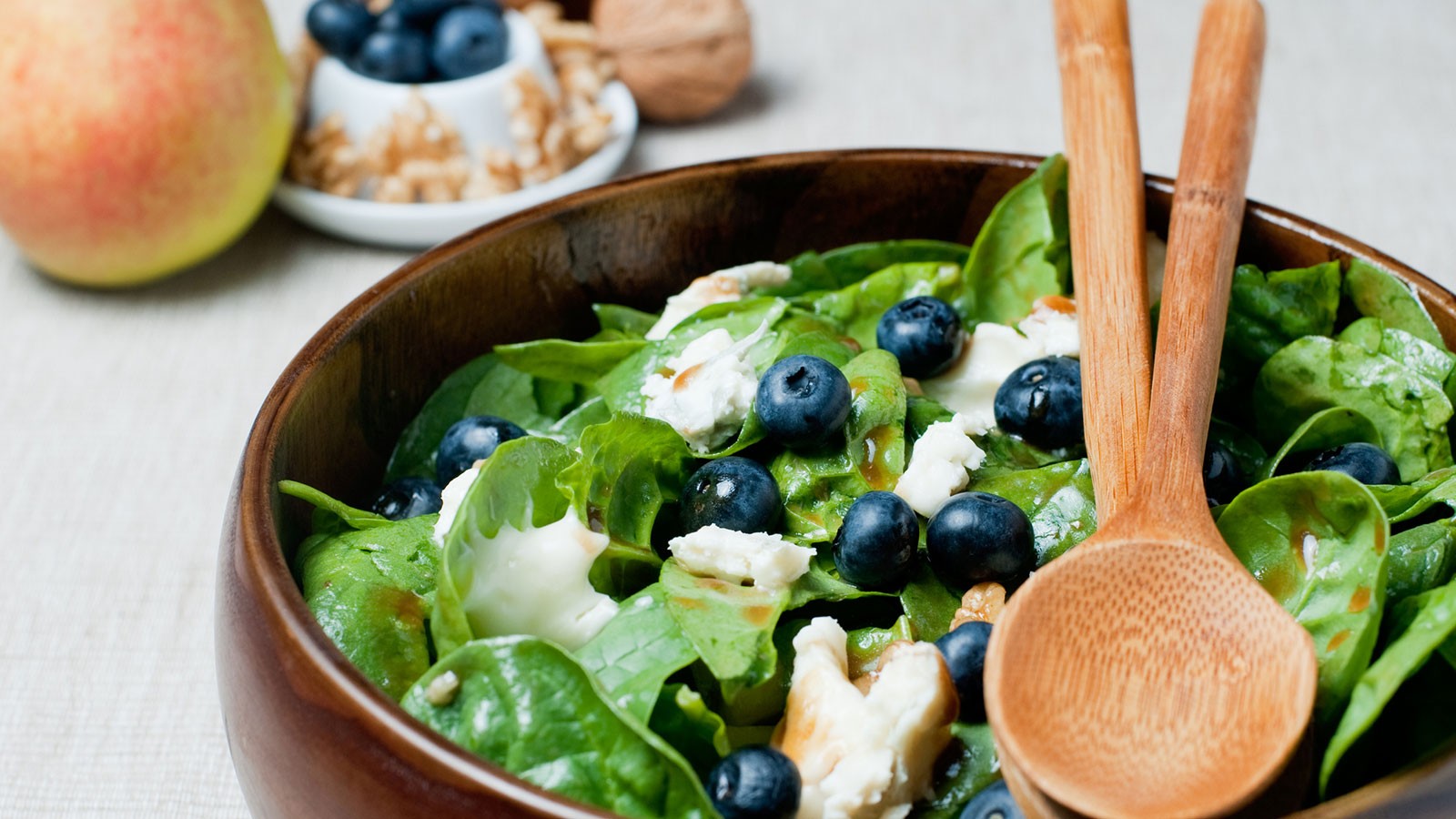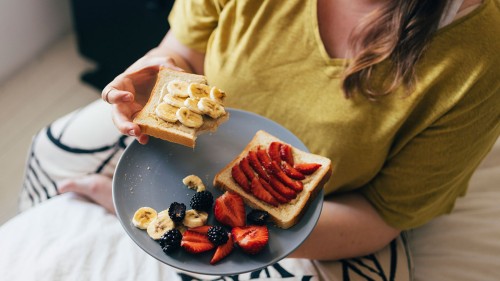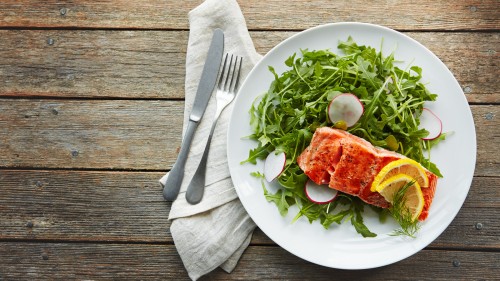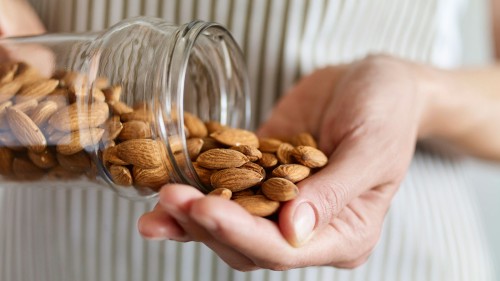WellnessVerge is reader-supported. We may earn a commission when you make a purchase through the links on this page. Learn more about our process here.
16 Foundational Habits for Healthy, Sustainable Weight Loss
Last Updated on August 14, 2023
Medically Reviewed by Anthony Dugarte, MD
Many people want to lose weight fast, but that is not the best way, according to data. Instead, gradual weight loss based on healthy habits produces the long-term results we all desire. We list 16 important habits below with insights on integrating them into your lifestyle.


- Eat Plenty of Protein
- Increase Your Fruit & Veggie Intake
- Eat More Whole Foods
- Decrease Refined Carbs & Sweets
- Drink More Water
- Avoid Sugary Drinks
- Drink Coffee & Green Tea
- Avoid or Limit Alcohol
- Cook More at Home
- Eat Slowly
- Practice Mindfulness
- Control Emotional Eating
- Get Good Quality Sleep
- Find Non-Food Rewards
- Move Your Body
- Surround Yourself with Support
- The Bottom Line
Losing weight is difficult for many people. Recognizing an opportunity, many brands and so-called “experts” spread many discombobulated ideas that convince people to believe that the newest fad diet or product will effortlessly and quickly help them lose weight.
However, this weight often comes back, sending many into an unhealthy and sometimes even dangerous pattern of yo-yo dieting.
We understand your frustration and disappointment. We have listened to countless stories in the field, and some members of our editorial team here at WellnessVerge have experienced this journey first-hand. The reality is that there are no shortcuts to losing weight (but you already knew that). Rediscovering and adopting healthy principles and changing your habits is the key to getting results. (Ignoring most social media noise about weight loss also helps.)
But that is easier said than done. So below, we list the most practical, evidence-based habits that will lead to safe, effective, and sustainable weight loss. We also include ideas and insights on integrating them into your life.
If you are just starting your journey, we want to point out that starting slow is okay. Start with as many, or as few, of these habits as you can handle, and keep working toward small improvements over time. They will add up, and you will achieve weight loss.
1. Eat Plenty of Protein
Protein helps you feel satisfied between meals, have steady energy, and maintain proper health. Many studies show that higher-protein diets can aid in weight loss and reduce appetite. (1)
You don’t need excessive protein to help you lose weight, but you need a minimum amount with each meal to meet your daily needs.
For most of us, the recommended amount is 0.8–1.0 grams of protein per kilogram of body weight. For a 150-pound woman, this is about 55–68 grams of protein per day. (2)
Research shows that people who increase their protein intake from 15% to 30% (of their daily calories) eat 441 fewer calories each day due to an increased feeling of fullness. (3)
For my clients, I recommend that 20–30% of their calories come from high-protein foods such as poultry, lean beef, fish, eggs, beans, lentils, and dairy.
Put Into Practice: To achieve weight loss, aim to consume 25%–30% of your calories daily from protein. Here’s a helpful resource to calculate your daily dietary needs based on your personal details. For simple ideas on adding more protein to your diet, see our list of 9 Nutritious Protein-Rich Foods.
2. Increase Your Fruit and Vegetable Intake
If you're trying to lose weight, load up your snacks and meals with plenty of fruits and veggies. They are naturally low in fat and calories but are also filling. Their water and fiber content makes them a high-volume food without the increase in calories. Because of this, studies have shown that consuming fruits and vegetables at the right daily serving size contributes to weight loss. (4, 5)
In addition to helping with weight loss, studies have shown that increasing fruit and vegetable intake is also linked to a lower risk of diabetes, high blood pressure, cancer, and heart disease. (6)
Put Into Practice: Aim to consume 1.5–2 cups of fruits and 2–3 cups of vegetables per day. We provide a list of some of the healthiest fruits and vegetables in this article.
3. Eat More Whole Foods
Eat more natural, whole foods rather than processed “diet” foods. Processed foods are not as filling or nutritious, and they can actually lead to overeating. They can also contain a lot of sodium. (7)
Remember that just because a product is lower in calories or fat doesn’t mean it is healthy.
Fill your plate with plenty of fruits, vegetables, lean proteins, and whole grains, and minimize your intake of packaged convenience foods.
Put Into Practice: Dive deeper into processed foods to avoid them, plus tips on shopping at the grocery store. Also, here is a list of nutritious foods you can eat instead.
4. Decrease Refined Carbs and Sweets
Carbs are not necessarily the enemy when it comes to managing your weight. But limiting refined carbs can help. Refined carbs are those that have been modified and stripped of many of their nutrients.
Examples include white bread, pizza, pasta, white flour, desserts, and sugary breakfast cereals. These types of carbs lack nutrients and fiber and therefore do not fill you up. I’ve seen these foods cause more cravings in my clients and lead to overeating.
Instead, choose more nutritious carbs. Think whole-wheat bread, quinoa, steel-cut oats, and starchy veggies like potatoes, squash, and peas.
5. Drink More Water
Research shows that drinking water before meals could reduce calorie intake, temporarily boost your metabolism, and be an effective weight management tool. Therefore, aim to drink 4–8 glasses of water (1–2 liters) at least 30 minutes before a meal. This can help make you feel less hungry, and you won't eat as much. (8)
Drinking more water, in general, can help improve your metabolism and support weight loss. (9) If your water intake is too low, it can impair digestion and make it harder to lose weight.
Put Into Practice: Men should aim to drink at least 15.5 cups of water per day and women 11.5 cups. For additional ideas and health benefits, see our guide for ways to drink more water.
6. Avoid Drinking Sugary Drinks
When trying to slim down, it’s important to take inventory of what you are drinking and how this may sabotage your weight loss efforts. Sugary drinks are loaded with calories that don’t fill you up or quench your thirst. Instead, they tend to make you thirstier.
Avoiding juices, sodas, and those beloved sweet coffeehouse drinks will help you lose weight more quickly.
Many studies have suggested that sugar-sweetened beverages may be associated with weight gain and that lowering sugar intake may be linked to a lower weight. (10, 11, 12)
Put Into Practice: Try staying hydrated with plain, naturally-flavored, or seltzer water. Also, try making healthy versions of your favorite coffee drinks at home.
7. Drink Coffee and Green Tea
Caffeine, in moderation, can give your metabolism a slight boost. Specific ingredients in green tea called catechins may be responsible for this. Some research shows that those who consume caffeine in moderation tend to have lower body weight and body fat. (13)
However, limiting any added creamer or sweeteners is important as these calories can add up quickly.
Moderate intake of these beverages is no more than 2–3 cups per day.
8. Avoid or Limit Alcohol
Alcohol can sabotage weight loss efforts. Even if you’re choosing lower-calorie cocktails, they can still add up. While moderate alcohol intake may not lead to weight gain, it can make it more difficult to lose weight. (14)
This is because alcohol is filled with empty calories and sugar and can lead to poorer food choices.
9. Try Making the Majority of Your Meals at Home
Making a habit of cooking most of your meals at home empowers you to control what you eat and the number of calories you consume. This may also result in weight loss.
Eating out or getting take-out means larger portions, higher calories, and increased sodium and fat. And let’s not forget that you will likely save money by eating at home.
One study found that people who cooked at home consumed approximately 200 fewer calories than people who ate out more often. The study also concluded that cooking at home often results in healthier diets regardless of whether you’re trying to lose weight. (15)
Put Into Practice: A plan is key to cooking more at home. Take some of the guesswork out of it by following our Simple 7-Day Meal Plan for Weight Loss.
10. Eat Slowly
Try getting into the habit of eating more slowly to help with your weight loss plans.
It takes some time (approximately 20 minutes) for your stomach to relay the message to your brain that you are full. If you're not pacing yourself, many unnecessary calories can be consumed in those 20 minutes.
One study suggests that people who ate at normal or slow speeds were less likely to become obese than quick easters. (16)
Try putting your fork down between bites, chewing your food thoroughly, and using a timer to help slow down your meals and reduce your calorie intake. This leads us to the next habit of mindful eating.
11. Practice Mindfulness When Eating
Focusing on your food is an important habit to create and will help your weight loss efforts. When eating becomes a mindless experience, you tend to eat more quickly and take in more calories.
Practicing mindfulness when eating is about redirecting your attention to what you are eating and how you’re feeling, creating a more intentional experience. Mindful eating may help reduce food cravings and portion control, which may help support weight loss. (17)
Mindful eating is a scientifically-supported habit for weight loss. A study found that participants who completed a 6-month mindful eating seminar lost an average of 26 pounds and did not regain any weight in the following 3 months. (18)
Put Into Practice: Try to avoid watching TV, scrolling through your phone, working, or driving while eating. Being mindful during meals is part of a comprehensive approach called Intuitive Eating. Read our beginner’s guide to get started.
12. Control Emotional Eating
If you find yourself eating when you’re stressed, anxious, bored, or lonely, and not necessarily when you’re hungry, you are not alone. People often turn to food as a source of comfort. That’s because eating makes us feel good due to the release of a brain chemical called dopamine. (19)
Recognizing these emotional triggers can help improve your weight loss efforts and help stop the cycle of emotional eating.
Try different alternative activities if you’re reaching for food while not hungry. Examples include meditation, a hot bath, yoga, walking, listening to a podcast or music, or reaching out to a friend.
Stress is often linked to a lack of sleep, which we will cover in the next section.
Put Into Practice: We list additional tips and ideas in our Evidence-Based Ways to Relieve Stress and Anxiety.
13. Get Good Quality Sleep
Quality sleep is an essential part of weight loss success. If you’re not getting enough sleep, you’re more likely to experience cravings during the day. (20) According to the CDC, roughly one-third of American adults do not get enough sleep each night. (21)
Specifically, getting an adequate amount of sleep supports the release of leptin, a hormone that regulates your appetite by helping you feel full. On the other hand, clinical studies have found that not sleeping enough leads to elevated ghrelin (the “hunger hormone”) levels, which can lead to weight gain. (22, 23)
Put Into Practice: Aim to get 7–9 hours of sleep each night. Improving sleep quality includes creating a healthy, consistent nighttime routine (such as meditating or having a warm bath before bed), managing stress levels, and eating healthy. You can get more tips on getting a good night’s rest in our article here.
14. Find Non-Food Rewards for Your Success
As you move through your weight loss journey, rewarding your progress with food may be tempting. Often, food rewards can undermine your hard work and become an obstacle to reaching your weight loss goals.
However, having non-food rewards along the way can help keep you motivated and are a fun way to celebrate milestones. Non-food rewards can be just about anything that brings you joy. Some examples are buying new clothes, getting a new haircut, listening to an edifying podcast, purchasing tickets to an event, having a night out, or catching up with friends.
15. Move Your Body
Participating in some types of exercise is one of the best habits to embrace weight loss. Exercise isn’t necessarily running on a treadmill at the gym or joining an intense cross-fit program. Any form of exercise can boost your metabolism and help you reach your weight loss goals.
Finding an activity that you love will help keep you moving and shed those unwanted pounds. Try walking, dancing, hiking, or playing frisbee with your dog. Any form of movement is better than nothing. In fact, you can aim to get at least 10,000 steps per day.
However, as you progress in your fitness journey, remember that increasing your daily calorie burn can help you lose weight faster. A combination of high-intensity cardio and strength training is best. (24)
Put Into Practice: Getting into it could be difficult if you haven’t exercised in a while. Develop a plan by reading our practical approach to Exercising for Beginners.
16. Surround Yourself with Support
Surrounding yourself with family, friends, or a support group will provide much-needed encouragement and increase your weight loss success. This may include reaching out to some folks you trust (maybe even those who had success in losing weight) and letting them know about your journey so they can take an interest. You can ask them to follow up on your progress weekly or bi-weekly, creating a sense of accountability for you.
One study found that people who included a weight-loss partner lost significantly more belly fat than those who were losing weight independently. (25)
The Bottom Line
We’ve covered a lot of ground here. The most important thing now is to get started. Here are a few suggestions:
- Do not try to work on all 12 of these habits right away. Instead, pick one or two habits that appeal to you the most or appear effortless to maintain.
- Learn more about the habits you selected from our provided resources.
- Set aside some time (make an appointment with yourself) to write out steps you need to take to integrate the habit into your life and which obstacles may get in the way. Do not underestimate the small details.
- Set a daily reminder around bedtime to reflect on what went well and what didn’t. No judgment here; just be honest with yourself and make minor adjustments. Taking notes helps too.
- Set time aside on the weekends to reflect on your journey and review your notes. If you feel that the habit you have been working on is sticking, consider focusing on the next habit from the list.
- Integrate as many of these habits over time as you can. They all work together in a holistic and synergetic way.
A famous Chinese proverb says, “A journey of a thousand miles begins with a single step.” Small steps add up over time. You’ve got this!
At WellnessVerge, we only use reputable sources, including peer-reviewed medical journals and well-respected academic institutions.
- The role of protein in weight loss and maintenance:
https://pubmed.ncbi.nlm.nih.gov/25926512/ - How much protein do you need every day? - Harvard Health:
https://www.health.harvard.edu/blog/how-much-protein-do-you-need-every-day-201506188096 - A high-protein diet induces sustained reductions in appetite, ad libitum caloric intake, and body weight despite compensatory changes in diurnal plasma leptin and ghrelin concentrations:
https://pubmed.ncbi.nlm.nih.gov/16002798/ - A Comprehensive Critical Assessment of Increased Fruit and Vegetable Intake on Weight Loss in Women - PMC:
https://www.ncbi.nlm.nih.gov/pmc/articles/PMC7399879 - Dietary intakes associated with successful weight loss and maintenance during the Weight Loss Maintenance Trial:
https://www.ncbi.nlm.nih.gov/pmc/articles/PMC3225890/ - Fruit and vegetable consumption and mortality from all causes, cardiovascular disease, and cancer: systematic review and dose-response meta-analysis of prospective cohort studies:
https://www.bmj.com/content/349/bmj.g4490.full.pdf - NIH study finds heavily processed foods cause overeating and weight gain | National Institutes of Health (NIH):
https://www.nih.gov/news-events/news-releases/nih-study-finds-heavily-processed-foods-cause-overeating-weight-gain - Effect of Pre-meal Water Consumption on Energy Intake and Satiety in Non-obese Young Adults:
https://www.ncbi.nlm.nih.gov/pmc/articles/PMC6209729/ - Increased Hydration Can Be Associated with Weight Loss - PMC:
https://www.ncbi.nlm.nih.gov/pmc/articles/PMC4901052/ - Intake of sugar-sweetened beverages and weight gain: a systematic review - PubMed:
https://pubmed.ncbi.nlm.nih.gov/16895873/ - The role of sugar-sweetened beverages in the global epidemics of obesity and chronic diseases - PubMed:
https://pubmed.ncbi.nlm.nih.gov/35064240/ - The Dose Makes the Poison: Sugar and Obesity in the United States – a Review - PMC:
https://www.ncbi.nlm.nih.gov/pmc/articles/PMC6959843/ - The effects of caffeine intake on weight loss: a systematic review and dos-response meta-analysis of randomized controlled trials:
https://www.tandfonline.com/doi/abs/10.1080/10408398.2018.1507996?journalCode=bfsn20 - Alcohol Consumption and Obesity: An Update - PMC:
https://www.ncbi.nlm.nih.gov/pmc/articles/PMC4338356/ - Is cooking at home associated with better diet quality or weight-loss intention? - PubMed:
https://pubmed.ncbi.nlm.nih.gov/25399031 - Effects of changes in eating speed on obesity in patients with diabetes: a secondary analysis of longitudinal health check-up data:
https://bmjopen.bmj.com/content/8/1/e019589 - Mindfulness Approaches and Weight Loss, Weight Maintenance, and Weight Regain - PubMed:
https://pubmed.ncbi.nlm.nih.gov/29446036/ - Effect of Pre-meal Water Consumption on Energy Intake and Satiety in Non-obese Young Adults:
https://pubmed.ncbi.nlm.nih.gov/22440077/ - Dopamine systems and biological rhythms: Let’s get a move on - PMC:
https://www.ncbi.nlm.nih.gov/pmc/articles/PMC9364481/ - Sleep | The Nutrition Source | Harvard T.H. Chan School of Public Health:
https://www.hsph.harvard.edu/nutritionsource/sleep/ - Centers for Disease Control and Prevention:
https://www.cdc.gov/media/releases/2016/p0215-enough-sleep.html#:~:text=More%2520than%2520a%2520third%2520of,Morbidity%2520and%2520Mortality%2520Weekly%2520Report. - 1 in 3 adults don’t get enough sleep:
https://www.sciencedirect.com/science/article/abs/pii/S0026049518300635?casa_token=pK3oUNjPs3UAAAAA:myhiawI8aOyaVDlsfyiTz3sGCXMa3v5MmQD2H4dGBq_CkQfgX-IP5TMEKy26_0J6fczmN7LRCg - 3 ways decreased sleep contributes to overeating | Obesity Prevention Source | Harvard T.H. Chan School of Public Health:
https://www.hsph.harvard.edu/obesity-prevention-source/2010/01/01/3-ways-decreased-sleep-contributes-to-overeating-2/ - Role of Physical Activity for Weight Loss and Weight Maintenance - PMC:
https://www.ncbi.nlm.nih.gov/pmc/articles/PMC5556592/ - Involving support partners in obesity treatment:
https://pubmed.ncbi.nlm.nih.gov/15796642/
- Eat Plenty of Protein
- Increase Your Fruit & Veggie Intake
- Eat More Whole Foods
- Decrease Refined Carbs & Sweets
- Drink More Water
- Avoid Sugary Drinks
- Drink Coffee & Green Tea
- Avoid or Limit Alcohol
- Cook More at Home
- Eat Slowly
- Practice Mindfulness
- Control Emotional Eating
- Get Good Quality Sleep
- Find Non-Food Rewards
- Move Your Body
- Surround Yourself with Support
- The Bottom Line








